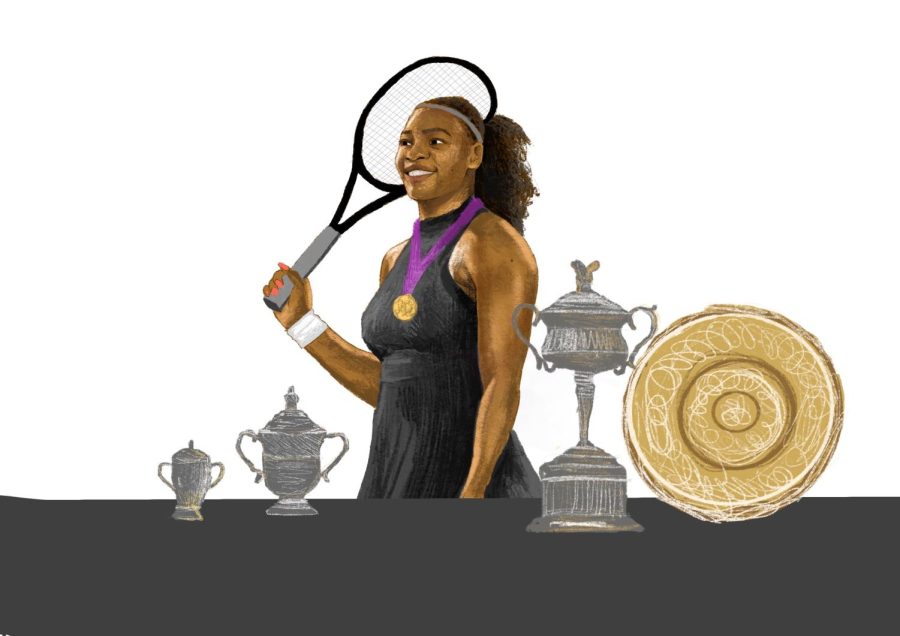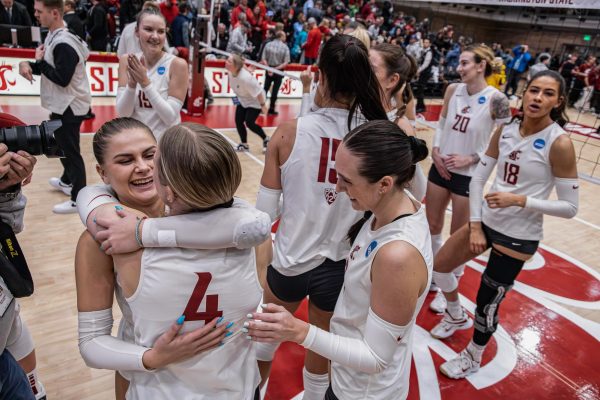The women’s Tennis GOAT calls it a career
Serena Williams legacy will live far beyond the court.
Serena Williams is the GOAT of tennis with73 singles titles, 23 doubles titles, two mixed doubles titles and four Olympic gold medals but her impact extends beyond the court.
September 8, 2022
Seventy-three singles titles. Twenty-three doubles titles. Two mixed doubles titles. Four Olympic gold medals. The most singles grand slam titles by anyone during the open era. Most consecutive weeks ranked No. 1 in the world. Serena Williams is one of the most decorated tennis players to ever touch a racket, but her legacy goes far beyond the court.
Beyond tennis, Serena has had a major impact on several cultural, social, racial and gender issues. She was the first Black female grand slam tournament winner since the 50s, she competed with the men for the title of best tennis player in the world and she never shies away from speaking her mind.
Along with her sister Venus Williams, she gave representation for her community and became one of the most recognizable U.S. athletes to ever play. Without Venus, Serena does not believe she would be in the position she is in today.
“I wouldn’t be Serena if it wasn’t for Venus. So thank you, Venus,” Williams said immediately following her final career match.
Many young athletes in the sport, which is still white-dominated, attribute the duo of Serena and Venus for being able to pursue tennis as a career. One notable young player who directly credited the sisters was 18-year-old Coco Gauff.
“I play because I saw somebody who looked like me dominating the game,” Gauff said.
She changed the way that Black women were looked at in the sport of tennis and in sports as a whole. She challenged the stigma and norm that tennis was a white man’s sport, by becoming one of the most decorated tennis players of all time.
When she showed passion, she was considered a stereotypical Black woman and described to be “aggressive” and “savage.” But the same action performed by a white man in the sphere is attributed to their passion and dedication to their craft. Serena sought to fight these gender and racial norms through the way she knew best, being herself and dominating her sport.
It did not always work out. She faced racial taunts during her matches and in 2018 after a viral disagreement with an umpire, an Australian newspaper released a caricature that focused on many stereotypical racial features. Serena would have people defend her from this repulsive behavior from publications such as the newspaper and those fans, but it was something she was constantly exposed to.
Being vocal was always something that Serena thought was necessary, because what is a platform if you are not using it? She advocates against police brutality on all of her social media platforms, she supported Colin Kaepernick’s movement in kneeling during the national anthem and she is vocal in the struggles she faces in her day-to-day life as a Black woman.
Serena is someone who always gave back to her communities. In 2016, along with Venus she opened a community center to offer therapy for victims of violence in Compton, California. She is also a United Nations International Children’s Emergency Fund goodwill ambassador, which is a direct correlation with the effect she has on the world outside of just being a good tennis player.
In 2017, she gave birth to her first child which resulted in a very taxing and difficult pregnancy where she said she almost lost her life. She had to undergo an emergency cesarean-section, had blood clots and had several other complications.
Even while facing a reality as scary as being close to death, she utilized this experience to highlight how this issue is not unique to her. She wanted to raise awareness for pregnancy complications and the alarming rate that they happen to women of color.
Leaving tennis behind was not a quick and easy decision, however.
I hate that I have to be at this crossroads. I keep saying to myself, I wish it could be easy for me, but it’s not. I’m torn: I don’t want it to be over, but at the same time I’m ready for what’s next,” she said in a Shadow Leauge article.
Serena Williams transcends sports and gives a voice to many issues she has faced in her time in the spotlight. Although she will no longer be competing in the sport of tennis, her legacy will live on and she will continue to create positive change in the world in her post-playing career.






















